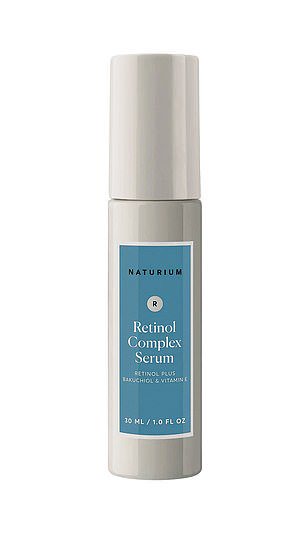On our quest for great skin we face a nonstop barrage of bold claims from brands about the next miracle cream.
Promises that the products’ actives – ingredients that target specific concerns – will be the magic bullet to solve our skin woes can be confusing and overwhelming.
And who has the energy for a ten-step routine using a glut of lotions and potions with unpronounceable names?
The only way to be certain of what will really make a difference to your skin is to look at the science, as a handful of actives are backed up by robust proof.
I’m calling these proven ingredients The Big Five and they are, drumroll, please: retinoids, vitamin C, alpha hydroxy acids (AHAs), niacinamide and peptides.
According to Dr Ifeoma Ejikeme, the founder of London’s award-winning Adonia Medical Clinic, these five hero ingredients are ones that ‘have stood the test of time, with decades of studies proving their long-term benefits’.
You may have heard of them but, if you are uncertain of whether they are right for your needs, here’s a cheat sheet decoding what these active ingredients will do to help your skin and also our recommended picks. Use them alongside your usual cleansing and sun-protection routines.
RETINOIDS
An umbrella term for derivatives of vitamin A, retinoids teach skin to act more youthfully, increasing collagen production, visibly firming and plumping the skin and improving surface-level cell turnover – meaning that they’re good for anti-ageing and brightening skin tone. They also offer antioxidant protection. Because they can irritate some skins before tolerance is built up, start with a weaker strength twice a week to give yourself a chance to acclimatise.
AKA Retinol, retinal, tretinoin.
Need to know They will make skin a little more sensitive to sun damage, so always use an SPF.
Try Naturium Retinol Complex Serum (£22, spacenk.com); or the more budget-friendly The Ordinary 0.5% Retinol in Squalane (£7.80, sephora.co.uk).
VITAMIN C
One of the most researched vitamins to apply topically, this is a potent antioxidant that shields skin from environmental damage, reduces pigmentation and brightens the complexion. When melanocyte cells in your skin sense an attack from UV light, they shoot up ‘umbrellas’ of melanin pigment to protect your skin’s DNA from damage, causing age spots. Vitamin C is integral to inhibiting this pigmentation. Pick one with a minimum strength of ten per cent, or five per cent if you have sensitive skin, as it can be too tingly for some (more than 20 per cent is counterproductive, so don’t bother).
AKA Ascorbic acid, L-ascorbic acid, ascorbyl glucoside, tetrahexyldecyl ascorbate.
Need to know It’s vulnerable to air and light, so choose opaque or darkened packaging with air- restrictive bottles to keep it stable.
Try Dermatica Vitamin C Fresh Batch Ascorbic Acid (£15.50, dermatica.co.uk).
NIACINAMIDE
This versatile super-soother calms redness and inflammation, strengthens the skin barrier, boosts ceramide production and protects against moisture loss. It’s also been shown to reduce wrinkle depth, regulate sebum production and minimise the appearance of pores, so it’s one for all skin types.
AKA Vitamin B3, nicotinamide.
Need to know It is very stable, unaffected by light, heat or water and mixes well with other actives.
Try Glow Recipe Watermelon Glow Niacinamide Hue Drops in Rosy Glow (£32, cultbeauty.co.uk); or the great-value Q+A Niacinamide Facial Serum (£6.95, hollandandbarrett.com).
AHAs
Alpha hydroxy acids are chemical exfoliants, so they help shed dead skin cells, leaving you with a smoother complexion, more even skin tone and less pigmentation. By promoting cell turnover, skin appears more youthful and radiant over time.
AKA Glycolic acid, lactic acid, mandelic acid.
Need to know They’re pointless when used in rinse-off products, as they need time to work on the skin, so integrate them into your routine with a toner or serum rather than a cleanser.
Try Paula’s Choice 6% Mandelic Acid + 2% Lactic Acid Liquid Exfoliant (£13, paulaschoice.co.uk).
PEPTIDES
As portions of amino acid chains, these are the building blocks of your skin and have restorative properties.
They soothe, increase firmness and reduce the appearance of wrinkles. While they are newer than the others, Dr Ejikeme notes, ‘Peptides show promise and there’s good evidence showing increased moisture and reduced water loss, but they don’t have the same level of extensive research backing just yet.’
AKA Amino acids.
Need to know Peptides can degrade from exposure to light and air, so avoid jars of cream.
Try Byoma Phyto-Mucin Glow Serum (£14.99, boots.com).
UNDER A TENNER
Burt’s Bees Lemon Butter Cuticle Cream (£6.99, sephora.co.uk) is an unctuous cream with vitamin E and sweet almond oil to keep cuticles soothed and nails nourished. It has a unisex lemon scent and slips easily into your bag.
Vote in our Beauty Awards for the chance to win a spa break
Breaking: we are launching the inaugural YOU Beauty Awards and want to hear about your top products. Cast your vote at mailplus.co.uk/awards and you (and a plus one) could win an indulgent overnight stay at The Nici hotel in Dorset (below) where you’ll enjoy a sea-view suite, dinner, a 60-minute spa treatment and use of the hotel’s luxury facilities; thenici.com.










































































